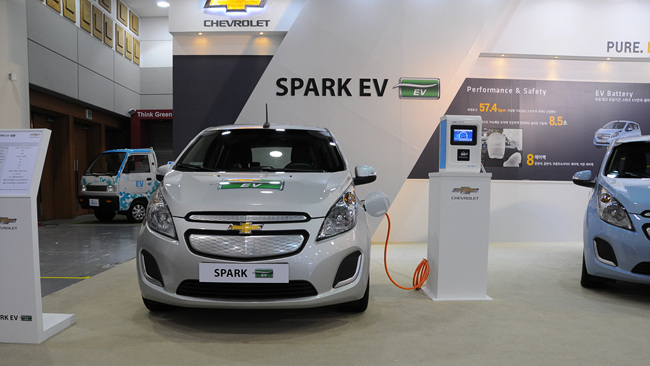POSCO has been producing the materials for electric vehicles and parts, betting heavily on the future development of electronic autos as environmental regulations are getting tougher on vehicles powered by petroleum fuels.
In particular, the steel giant has been focusing on turning out super-light and high-strength steel sheets and magnesium steel plates in line with the global trend to produce EVs.
The steelmaker plans to go further and produce lithium, a key component for lithium batteries, in cooperation with its affiliates likes of POSCO TMC, POSCO Camtech, and POSCO ICT, among others, which have been engaged in the production of core motors for vehicles, and parts for batteries and rechargers.
POSCO officials said on March 23 that the steel maker has been producing lithium, steel plates for electric cars, a special steel for use in motors and magnesium planks.
The steel maker began construction of a lithium plant in Argentina in February with the annual capacity to turn out 2,500 tons of the material, which the steel maker plans to supply to the makers of anodes for electric batteries for use in electric cars. The lithium output is equivalent to the lithium quantity needed to produce the lithium batteries for 60,000 electric cars as some 40 kg of lithium is needed to produce lithium batteries for one electric car. Salta State, where the plant is being built, is located near a mine with estimated reserves of lithium at 1.5 million tons. The plant’s capacity will be increased to 40,000 tons per year by 2018.
Lithium production is one of the next growth engines envisaged by Chairman Kwon Oh-joon. He stressed that the steel maker should focus on its forthcoming growth engines, including hard steel plates for electric cars, related parts and materials.
POSCO is preparing for the era of EVs by working materials not limited to steel. The other global leading steelmakers are struggling to find clients amid a global supply glut, but POSCO is sharpening its competitive edge with parts and materials for EVs, which require higher quality than “ general” auto parts.
At the same time, POSCO ICT is planning to take charge of establishing EV infrastructure and integrated monitoring-center management. BMW signed an agreement for EV charging infrastructure with POSCO ICT before the debut of its EV i3 in April this year. POSCO ICT is the first private-sector company in Korea that is engaged in this type of business.
The company is already supplying steel sheets for EVs, and is going to focus more on related components and materials. The super-light, high-strength steel plates developed by POSCO are used mainly to manufacture EV frames and outer panels. When compared to existing products, these use at least 40 percent ultra higher-strength steel (UHSS) to reduce the weight of a vehicle body by approximately 25 percent, while also satisfying the international collision safety regulations that become effective in 2015. The products are already used in Renault Samsung Motors’ SM3 Z.E. and GM Korea’s Spark EV. Kia Motors’ Soul EV is going to use the same products, too.
POSCO is concentrating as well on the development of magnesium, which is used in vehicle frames and panels, and neodymium permanent magnets for use in motors. The company will set up a pilot plant in Argentina.
The steelmaker is focusing its corporate resources on the promotion of its electrical steel sheets, too. The demand for electrical sheets as a material for EVs, hybrid cars, and the new and renewable energy industry is skyrocketing. In eco-friendly cars, these are used in motors or as iron cores of transformers.
POSCO established electrical steel sheet manufacturing facilities in Pohang (with an annual capacity of one million tons) and China (with an annual capacity of 0.3 million tons) and built another plant with a capacity of 0.3 million tons in India late last year. Tesla Motors’ Model S as well as the Spark EV and Soul EV are using the sheets.

Chevrolet’s Spark mini-electric vehicle produced with thin and tough new steel plates supplied by POSCO.(Photos:POSCO)
